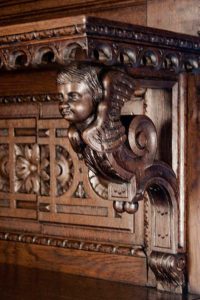The Legend Of Intaglio, Part 3
Last time, our hero Intaglio, a living puppet with dreams of literary grandeur, escaped a dismal writing sweatshop with his friend Marge and set out to find Total Freedom Island, where writers can write whatever they want, however they want, and get paid for it (yes, this is a fairy tale). They accepted a suspiciously convenient ride from a shady-looking coachman in a carriage pulled by a team of wombats. Now, they’re on their way to the fair port of Lucretia, where they hope to catch a ferry to the island.
If you’ve not been following along, it’s probably best to begin at Part 1. For the rest of you, onward to Part 3!
—————
Despite the coachman’s promise, Intaglio was able to get through several thousand “Bob’s your uncles” before the black carriage arrived at the waterfront of Lucretia, a dingy, dirty little town that was anything but a “fair port.” It was dark, murky, and smelled of spoiled fish. A collection of greasy, muscular fellows in striped shirts and stocking caps looked on with bored malevolence as the coachman unloaded his passengers. The team of wombats collapsed onto their rotund bellies, gasping for breath, shivering, and whining.
 “Ferry’s at the end of the dock,” said the coachman, pointing at a dilapidated wharf hung with cobwebs and missing several planks. A long, flat boat bobbed at the end of it, and a tall figure robed in black stood at the boat’s stern.
“Ferry’s at the end of the dock,” said the coachman, pointing at a dilapidated wharf hung with cobwebs and missing several planks. A long, flat boat bobbed at the end of it, and a tall figure robed in black stood at the boat’s stern.
Intagio set off toward the dock. Marge followed in his wake, rubbing her eyes and looking anxiously all around as if she had just awakened from an unpleasant dream. Or perhaps into one.
“Hold up, young’uns! You’ll be needing these.” The coachman held out two pairs of shiny golden coins. “It’ll take a ducat for the ferry and another to get you started on the island. Off with you then, and enjoy your freedom…while you may.”
At the ferry, the man in black wordlessly accepted a single ducat into his thin, bony hands from each of the two travelers and turned the boat toward a hazy patch on the horizon. It sailed along without any visible means of propulsion. Intaglio tried to start up a conversation with Marge, but she fell asleep again upon entering the boat. He turned his attention to the ferryman, but the fellow was silent as a tomb.
“Perhaps I’ll do a little writing to pass the time, then.” Intaglio pulled out a sheaf of paper, a quill, and a bottle of ink he’d liberated from Vinnie and Guido’s sweatshop during his escape and started scribbling one of the stories the Writing Fairy had planted inside his wooden noggin. It was the tale of a cup, and a sword, and a tree, and a green hill, and Intaglio was at the verge of sappy tears as he finished, it was so beautiful. This was why he wanted to be a writer. This was his true purpose in life! His mind spun at the thought of what he could accomplish in a place like Total Freedom Island, where his imagination was the only limit.
The sun was rising as the ferry boat reached the island, a jagged little cone of rock crowned with a diadem of colorful buildings alive with pennons and bunting that fluttered in the ocean breeze. Faint whispers of music drifted down to the waterfront. Intaglio helped Marge from the boat, which disappeared into a fogbank without waiting for any outbound passengers. She recovered from her stupor upon setting foot on the island. Her eyes shined, and her face was radiant with joy. “Oh, Intaglio, we made it! We’re free! I can’t wait to start writing!”
 They walked up a winding cobblestone path that led into the town. There was no gate, just a broad stone archway inscribed with the words, WELCOME TO TOTAL FREEDOM ISLAND. Below that, in smaller letters, was a motto: WE SEAL OUR OWN FATE.
They walked up a winding cobblestone path that led into the town. There was no gate, just a broad stone archway inscribed with the words, WELCOME TO TOTAL FREEDOM ISLAND. Below that, in smaller letters, was a motto: WE SEAL OUR OWN FATE.
Intaglio pondered that. “Sounds ominous.”
“It just means there’s no one to tell us what we have to write, so our success is in our own hands. Come on!” Marge hauled Intaglio along behind her as she hurried through the gate and into a broad plaza beyond.
The music was louder here, a merry tune that made Intaglio itch all over with the urge to dance. Or perhaps he’d picked up termites somewhere along the way. He hoped not. There were children of various ages seated at little round tables scattered about the plaza, and they were all writing or engaged in energetic conversation.
At first, no one seemed to notice Intaglio and Marge, but then a tall boy dressed in a top hat and blue frock coat trotted over to them, extending a hand. “Greetings, newcomers! Welcome to our island! My name’s Bill Coventry. I’m the current mayor, though we take that responsibility in turns. It’s my day job. Anyhow, you won’t want to waste a single minute of your time here, so let’s get you started straight-away. Follow me.”
Bill led them to a large wooden box at the center of the plaza. It looked like one of the cabinets Guiseppe made back home, framed with ornate scrollwork and carvings of chubby babies with wings. There was a window at its center that held a roll of paper, of the sort you might find on a player piano. Below that was a wide slot, below that, a row of buttons, and below that, a rectangular hole with a metal tray at its base. On the side of the cabinet was an enormous crank handle.
 “This is the T.F.I. Publication Acceptance, Promulgation, Evaluation, and Reimbursement System, or ‘PAPERS,’ for short. You insert a ducat into the machine, put your manuscript into the slot, and turn the crank. In a little while, somebody will come along and review your story on a five-point scale. You’re paid one ducat per point. It’s a merit system…the better your story, the more you get paid. While you’re waiting for your story to be reviewed, you need to evaluate somebody else’s story. We all work together, we all get feedback, and we all get paid. Simple as that. Understand?”
“This is the T.F.I. Publication Acceptance, Promulgation, Evaluation, and Reimbursement System, or ‘PAPERS,’ for short. You insert a ducat into the machine, put your manuscript into the slot, and turn the crank. In a little while, somebody will come along and review your story on a five-point scale. You’re paid one ducat per point. It’s a merit system…the better your story, the more you get paid. While you’re waiting for your story to be reviewed, you need to evaluate somebody else’s story. We all work together, we all get feedback, and we all get paid. Simple as that. Understand?”
Marge nodded. “Makes sense.”
“Actually, I don’t think I got all that, “said Intaglio, who had been watching a squirrel perched on a vacant table nearby. “What is this thing called again, and what does it do?”
Bill laughed. “Don’t worry about it. Instructions scroll up behind the window. Tell you what, once you’ve got a story written, come find me, and I’ll walk you through the steps.”
“I’ve got one already!” Intaglio pulled his manuscript from his jacket pocket and waved it at Bill.
“Excellent! So, first, you need to drop a ducat into the coin slot. It’s there on the right side, next to the window.” Bill pointed to a tiny opening Intaglio hadn’t noticed.
The coin went into the machine with a musical clink, and paper scrolled beneath the window, revealing a message in cursive script: Insert manuscript, press red button, and turn crank.
Intaglio did so. The manuscript vanished into the machine, a bell jingled, and the paper scrolled again. Return in three hours, then press black button to receive feedback and payment.
“That’s all there is to it,” said Bill. “Now, you can each take a turn at rating someone else’s work. Ladies first?”
Marge stepped up to the machine. “What do I do?”
“Press the green button and turn the crank.”
The machine clicked and whirred, a manuscript popped out of the slot, and there was a new message: Assign rating using numbered buttons. 5=Outstanding, 4=Average, 3=Smells, 2=Reeks, 1=Stinks on Ice.
“Kind of a strange rating system,” said Marge, “and harsh.”
“Well, we strive for excellence here. It’s a deep pool.”
Intaglio peered over Marge’s shoulder at the manuscript’s title. FAIRY TALE ROMANCE #708: THE LITTLE CHICKEN WHO CRIED WOLF. And below that, Once upon a time there was a little chicken. Who cried. Wolf.
“Hey, this is the same gorgonzola Vinnie and Guido made us write!”
Bill flipped a couple of pages. “Hmm. Probably from one of our recent arrivals, somebody still trying to break old habits. Our philosophy here is to encourage fledgling writers as much as possible. Skim through it and give it a rating, Marge, but be gentle…we wouldn’t want to crush someone’s dreams, would we?”
“No. I know how that feels.” Marge leafed through the document, looking more and more with each turn of the page as if she’d taken a bite out of a lemon. Her fingers wandered over the buttons. “Maybe a…three?”
“I wouldn’t go lower than four, if I were you. This is a fellow writer. Imagine how you’d feel.”
“Yeah, I guess so.” She pressed the “4” button. The machine chimed and scrolled. RECORDED.
“See, easy as pie. You’re already part of the community. How about you, Intaglio? Want to give it a go?”
“You bet.” Intaglio had been paying more attention this time, so he was able to repeat the process with only a little prompting from Bill. He squinted at the manuscript the machine ejected. FAIRY TALE ROMANCE #542: CINDERPUNZEL…Once upon a time, there was a girl. Named Cinderpunzel. With two ugly stepsisters. And long hair.
“Eww. This is as bad as the other story. I thought you said everybody here strives for excellence.”
“Maybe this one’s a slow starter. Give it a read.”
Intaglio’s face looked like Marge’s by the time he finished, and that was quite an accomplishment for someone whose head was carved from a block of wood. “I’m sorry, but this is awful, and the Writing Fairy said I always have to tell the truth.” Intaglio’s finger hovered over the “1” button.
Bill grabbed his shoulder. “Wait!”
Intaglio gave the button a decisive jab. The machine rattled, shook, and cut loose with an ear-piercing siren. Everyone in the plaza stopped writing and talking. A few stood up, fists knotted. Someone shouted, “What are you trying to do? Starve one of us?”
“No! I mean…I was just trying to give an honest score!”
“Try again,” Bill whispered in his ear.
Everyone was staring at him. Intaglio turned back to the machine. Under the window was a single line of text: PLEASE MAKE ANOTHER SELECTION.
He gulped and pressed the “4” button. The siren stopped, and the machine chimed agreeably. The children in the plaza returned to their writing and chattering.
Bill patted him on the back. “Don’t worry about it. There’s always a bit of a learning curve at first. I guarantee you’re going to fit right in.” He straightened his top hat. “You’ve got a few hours until your feedback’s ready…let’s go find you and Marge a day job.”
Oh, that’s right, Intaglio thought, the Writing Fairy said I needed one of those. I wonder what it is?
To be continued…









































Day job, indeed. And I loved the Narnia reference. A cup and a sword and a tree and the green hill indeed.
The Writing Fairy plagiarizes only from the best sources.
I see what you did there.
Well, that’s your problem right there, isn’t it? “Freedom” that’s “for its own sake” is never truly free. It’s a square circle. Dry water. An impossible universe.
For a moment I had thought this: that because everyone while waiting for their evaluations needed to review others, that meant the whole Island was built on a pyramid scheme. “You’ll only rise higher the more you have under you, persuaded they can get where you’re already going.” But I suppose this whole fantastic tale isn’t over yet …
Pyramid scheme? If only it was that simple.
I had thought this: that because everyone while waiting for their evaluations needed to review others, that meant the whole Island was built on a pyramid scheme. It such an interesting kind of movie..
Wow!!! Now this story is getting scary. The only way I can have a ‘great score’ is to give someone else who writes horrible a ‘great score’. So why should I, the yellow fairey, write well when I know the blue fairey will give me a ‘great score’ no matter what. Gesh!! This is a scary story!! I don’t know if I want to read anymore. :))
[…] In our last episode, we left our wooden-headed puppet hero on Total Freedom Island, where writers are free to write freely in freedom. Totally. He had just gone in search of a day job, accompanied by his friend and fellow writer Marge, and guided by the town mayor, Bill Coventry. […]